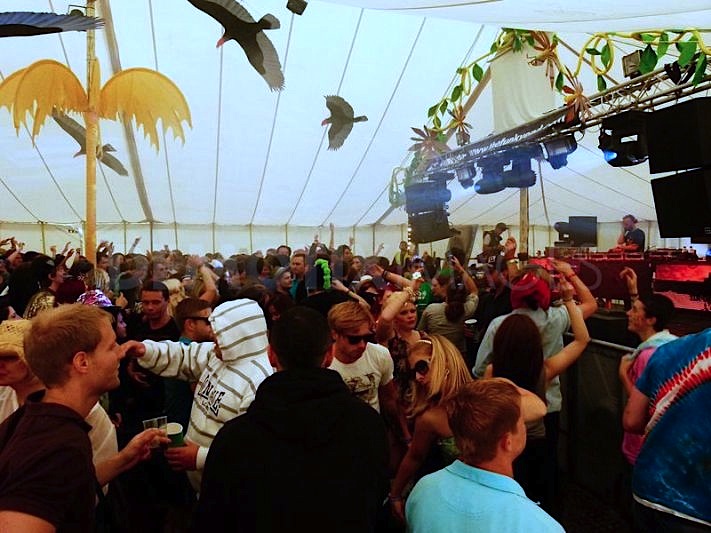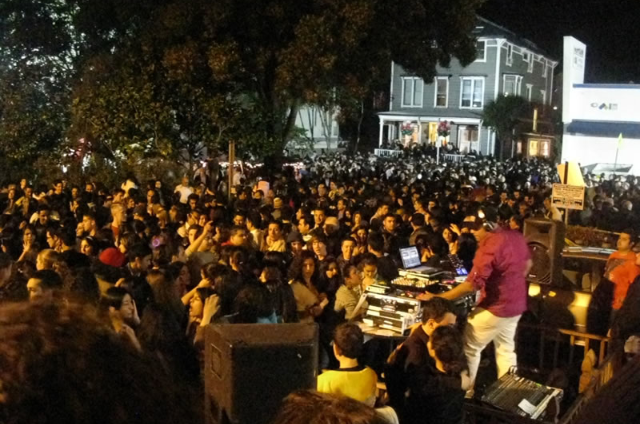
DJ festivals. We love them. From Ultra Music Festival in Miami to Tomorrowland in Belgium to Creamfields and Global Gathering in England, festivals are fun, exciting and adventurous. All together in the open air, it’s no surprise there can be a deep feeling of connectedness when we share the love of music and dance in our hundreds of thousands.
But there are also the smaller music festivals, where local DJs and bands come together to celebrate the scene in their own towns and cities. These are my favourite, because they are normally free, and they’re perfect for artist and DJs to both make contacts and expose their music to local folks. But have you ever thought about organising one of your own?
Why organise a festival?
Why would you want to? Because if you are having difficulty finding a venue to play at, one great alternative option is to organise an outdoor event! Of course this may sound to you like a great idea, or alternatively it might sound like something that’s totally out of your reach. Well, I’m here to tell you that indeed it is a great idea, but also that I’m living proof that it’s not out of reach, because I’ve been involved in a group who did it ourselves.
However, if you aren’t prepared, you could be in for a few surprises that could really mess up your show. So in this two-part post looking at organising a DJ festival, I’ll be using a case study from an event we did back a couple of years back – a one-day festival put together by a group of residents of our neighbourhood in Washington DC, USA – to show the steps you have to take and warn you of some of the pitfalls.
More about our festival
Our first DJ festival was a tremendous success, with 15 DJs and three bands performing over a six-hour period to more than 1,200 attendees. The festival featured DJs who all live or work in Washington DC, playing music ranging from house and electro to dubstep, funk, disco, hip-hop and pop. With one stage and a tent, we kept the music going all day long, with never a dull moment. During and since our that first festival, a lot of people have asked us how with a lean budget and in such a bad economic time we managed to put together such an amazing day of free, awesome music and community. Indeed, our neighbourhood is already buzzing about the 2013 festival.
Now, of course I realise that your city, town or neighbourhood might be different from ours, but I’m guessing that wherever you are your music community is supportive of local talent and – out of necessity – is also savvy about getting the most “bang for every buck” (there is indeed blood in the rock, as we found out). And as we managed it, we wanted to share with you our model for a local DJ-based festival.
Today, we’ll cover the groundwork – getting organised, budgeting and fundraising. In the next part we’ll get down to the practicalities of permits, sponsors, food and drink, marketing, DJs and on-the-day tips to make sure it all goes off smoothly.
Start with a small, strong, determined committee
Your organisers should be community driven and want to see local DJ talent get attention and respect it deserves. This committee should at least have the following roles: Local organiser (permits, vendors, city officials, project manager etc), sound guy/engineer/stage, graphic designer/web/print, promoter/booking/marketing, and finance. Of course, these roles will probably end up being spread out among fewer or more people, but they all need to be covered.
Choose people you know you can rely on to do what they say they’ll do, and look for people who are talented in a specific area that you know will be essential to having the event work. There were no “egos” in our group, and I recommend you strive for that kind of person too. As they say, “It’s amazing what you can accomplish when nobody cares about taking the credit”.

An important document to have is a timeline sheet, so you can work your way backwards from the day of the event. Give yourself 9 to 12 months before the target date. We met every week for nearly a year. The constancy and regularity of these meetings proved inspirational, constructive, and kept our eyes on the prize. They were also great fun! We aimed high, but not out of reach: keep your vision do-able.
I recommend you become a non-profit or a private company limited by guarantee. It takes a bit of paperwork and time, but ultimately will help you with donations, alcohol licences, sponsorships, and fundraising. Here are some tips on how to start a non-profit in the US and UK.
Plan your budget
Keep the production costs low. Your primary areas of costs will be the stage, permits, tents and tables, marketing and insurance. Most importantly keep a budget document that clearly shows your itemised expenses and income from fundraising, vendors and alcohol (beer gardens).
We paid $6,000 to rent the stages and sound equipment (and they were also one of our sponsors). The sound crew donated their time. Other fixed costs included electric generator ($900), portable toilets ($500 for three), police detail ($800), tents and tables ($600), bike racks ($150), backstage food ($250), posters and banners ($1,200), permits ($200), city inspectors ($500), insurance ($500), and on site electrician ($400).
We also spent $3,000 on items to help manage and market our fundraisers. The whole festival’s budget was under $15,000.
Organise small fundraisers leading up to the big day
These are how you get the money mentioned above. They need to be often; ours were about one per month. They need not be overly ambitious, but try and make them creative and fun. It’s helpful for each fundraiser to have an emphasis on local music. We held one at local club where we charged $5. We also asked convinced a local big act to play in one of our fundraisers for free. At each of these we asked all participants (including ourselves) to pay the door fee.
Ask local retailers and merchants to donate small items that can be used at fundraisers. We held silent auctions and raffles at local cafes and raised over $2,000 each time. Also, think about organising a Kickstarter campaign. We raised $1,500, and rewards included a custom-produced track and remix for a local singer. We also let people donate via PayPal to give directly.
Ask a local music retailer to donate speakers and amps for use during the festival in exchange for a prime sponsorship of the event. This alleviates the need for confusing and time-consuming gear changeovers (as well as chewing up DJ personal gear). We had a safe house – a volunteer-staffed truck – where mixers, CDJs and tables could be stashed when DJs weren’t performing.
Finding the perfect location for free
DJ-based events are perfect in parks or neighbourhood streets (block parties). I suggest before looking for a location begin volunteering at your local community. From there you’ll understand how local governments, city permits and licences work, plus you will build relationships with community leaders that will become beneficial for lobbying when you are putting your event together.
Just a cautionary note: Dealing with the multiple and essential permits for your location can be a pain in the ass! Seek out any city representative contacts you might know personally, and have them on board (or even better, on your board). Get them fired up about what you’re doing so they want to help advise and smooth the complicated path to obtaining those permits.

Here’s another tip: Most of the time there is a community website for your neighbourhood. Check it out and look for previous festivals and approach the organisers for lunch or coffee. We obtained a permit from Washington DC to hold our festival near an open park, a beloved (and famous) park. The city was a great help and we left the park cleaner than when we arrived.
When looking for a suitable venue, choose a location that excites the crowd and the DJs. You’ll also need a plan in case of rain. Either choose a date when rain is extremely unlikely, or have a “plan B” indoor location that can work. Understanding all the restrictions as far as your city or town is concerned is a learning curve, but it really is worth the trouble. One misstep and the game’s over. But if you earn a good reputation the first time it will be that much easier next year.
Next time…
So you’ve put your team together, formed a non-profit organisation, identified a budget and found a way to fundraise. What next? How do you get city permits and sell alcohol? How do you find and approach sponsors? Do you want food? If so, how do food vendors work? And how do you start a buzz around the festival? Who is in your DJ lineup? How do you organise them? That’s all the stuff we look at next time, in How To Host A Festival-Style DJ event, Part 2
Do you want to start your own festival? Have you done so? Got any tips you’d like to share, or care to to highlight any pitfalls for the unwary? Please share your thoughts in the comments.
• Mohamed Kamal is a DJ/producer turned entrepreneur from Washington DC, and founder of Audyolab.








